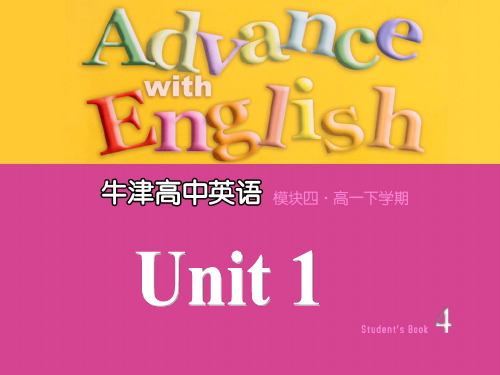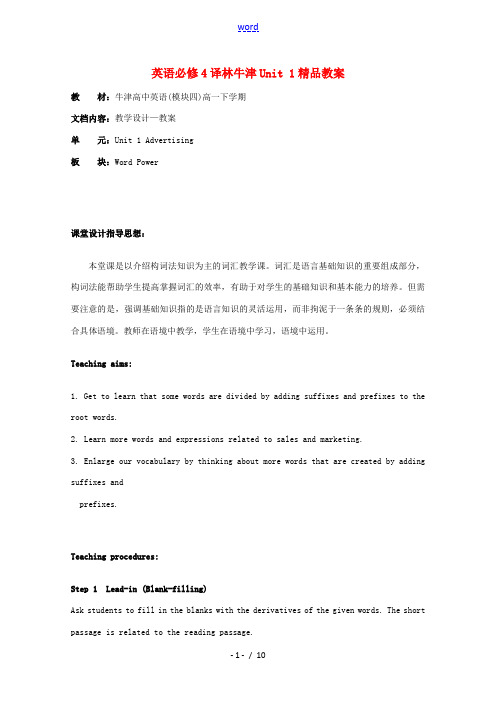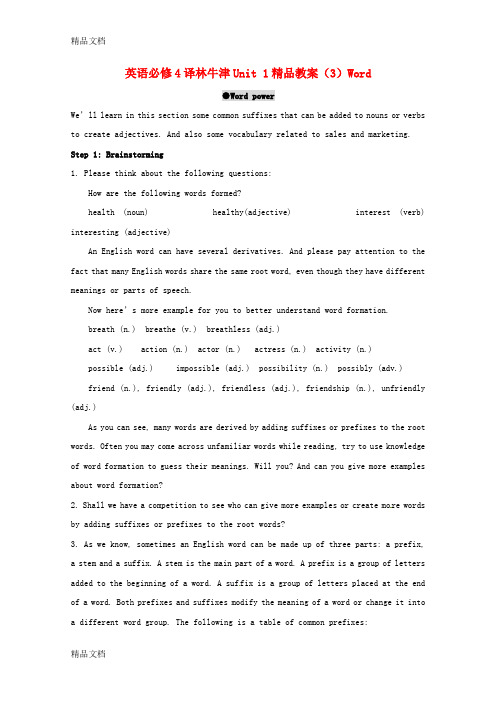牛津译林版高中英语必修模块四 4Unit1 Word Power学案-新版
高中英语 Book4 Unit1 word power学案牛津译林版必修4

高中英语 Book4 Unit1 word power学案牛津译林版必修4UNIT1TITLEWord PowerCLASS ARRANGEMENTclassesPERSON PREPARING Shao YingPERSON APPROVINGUSERSWEEKAIMS OR TASKSstudents will be able to:1、Get to learn that some words are divided by adding suffixes and prefixes to the root words、2、 Learn more words and expressions related to sales and marketing、3、 Enlarge our vocabulary by thinking about more words that are created by adding suffixes and prefixes、TEACHING REFERANCEPROCESSText、teaching materials、teaching coursewareStep1 Lead-in____________ (advertise) are an important part of life、 They use lots of______ (attract)pictures and _______ (excite)languages to sell products or services、________(general)speaking, there are two main types:______ (commerce)ads and PSAs、 They do not always tell you the_______ (true)、 We should be ________(care)、Step2 Using suffixes①Rootderivatives/new wordshealthinterestdependusedifficultweek②Think more words that are created this way、③SuffixMeaningExamples (adj、)-icalhaving the quality of-ablehaving the quality of-ouslike, full of-fulcharacterized by-lesswithout④ Word Puzzle 用所给单词的形容词形式填空Hidden wordFood and ________ are quite important to our human beings、 ( Fill in the blank with the hidden word、)Step3 Sales and marketingFill in the blanksI want to buy some milk________ from the shop、 ________of milk usually go up during this time、I like ‘Fresh’ milk very much because this band is really u________ 、 Recent sales________show that it is popular among _______、 The shop also gives much _______ of10 per -cent for cash、 Why don’t you have a try?。
牛津高中英语模块四Unit1WordPower

We can create adjectives by adding suffixes to nouns or verbs. Read the dialogue on Page 6 and think about how the adjectives in blue are formed.
Below are some of the different suffixes used to form adjectives:
• How are these words formed? • When you come across unfamiliar
words, do you often use the knowledge of word formation to guess their meanings? If so, can you give some examples?
Word Power
Using suffixes & Sales and marketing
Brainstorming
Look at the following words and
tell us what part of speech each
word is.
health n.
healthy adj.
• In order to make your new shop successful, do you think you would need to know about your competitor? • What else do you need to do?
Read the passage on Page 7. Focus on the meanings of the sales and marketing terms. You can compare your sales plan discussed before with the ideas introduced in this part. No matter what you are trying to sell, the basic rules of sales and marketing are always the same.
英语必修ⅳ译林牛津版unit1wordpower教案

●Word powerWe’ll learn in this section some common suffixes that can be added to nouns or verbs to create adjectives. And also some vocabulary related to sales and marketing.Step 1: Brainstorming1. Please think about the following questions:How are the following words formed?health (noun) healthy(adjective) interest (verb) interesting (adjective)An English word can have several derivatives. And please pay attention to the fact that many English words share the same root word, even though they have different meanings or parts of speech.Now here’s more example for you to better understand word formation.breath (n.) breathe (v.) breathless (adj.)act (v.) action (n.) actor (n.) actress (n.) activity (n.)possible (adj.) impossible (adj.) possibility (n.) possibly (adv.)friend (n.), friendly (adj.), friendless (adj.), friendship (n.), unfriendly (adj.) As you can see, many words are derived by adding suffixes or prefixes to the root words. Often you may come across unfamiliar words while reading, try to use knowledge of word formation to guess their meanings. Will you? And can you give more examples about word formation?2. Shall we have a competition to see who can give more examples or create more words by adding suffixes or prefixes to the root words?3. As we know, sometimes an English word can be made up of three parts: a prefix, a stem and a suffix. A stem is the main part of a word. A prefix is a group of letters added to the beginning of a word. A suffix is a group of letters placed at the end of a word. Both prefixes and suffixes modify the meaning of a word or change it into a different word group. The following is a table of common prefixes:Step 2: Learning about Word formationThe basic part of any word is the root; to it, you can add a prefix at the beginning and/or a suffix at the end to change the meaning. For example, in the word "un flatter ing," the root is simply "flatter," while the prefix "un-" makes the word negative, and the suffix "-ing" changes it from a verb into an adjective (specifically, a participle).English itself does not use prefixes as heavily as it once did, but many English words come from Latin, which uses prefixes and suffixes (you can use the word affix to refereither to a prefix or a suffix) quite extensively. For example, the words "prefix," "suffix," and "affix" themselves are all formed from "fix" by the use of prefixes: •"ad" (to) + "fix" (attached) = "affix"•"pre" (before) + "fix" = "prefix"•"sub" (under) + "fix" = "suffix"Note that both the "-d" of "ad" and the "-b" of "sub" change the last letter.Here are some of the most common Latin prefixes (for the meanings of the Latin roots, look up the words in a good dictionary):ab (away) abrupt, absent, absolvead (to) adverb, advertisement, afflictin (not) incapable, indecisive, intolerableinter (between, among) intercept, interdependent, interprovincialintra (within) intramural, intrapersonal, intraprovincialpre (before) prefabricate, preface preferpost (after) postpone, postscript, postwarsub (under) submarine, subscription, suspecttrans (across) transfer, transit, translateStep 3: Ready used materials for Word formationZero MorphemesSome affixes consist of no sounds at all. Zero morphemes DO exist, and we'll see why, and illustrate another concept, allomorphy at the same time.Consider the following words:Adjective Verbyellow yellowbrown browngreen greenpurple purpleThe relation between "yellow" (adjective) and "yellow" (verb) is exactly the same as that between "white" and "whiten", which we just considered. But the form of "yellow" doesn't change. So we say that we added a zero suffix:Verb/ \Adjective -Ø|yellowMeaning: "to make (more) yellow"Zero morphemes are obviously hard to spot because you can't hear them! In these cases you have to notice what ISN'T there. (Sherlock Holmes solves one of his cases by noticing that a dog DIDN'T bark. This was important because there was a situation where any dog would have barked. This is the kind of thinking you have to do to find zero morphemes.)AllomorphyBut now we have two ways to make Adjectives into Verbs meaning "to make (more) Adjective": "-en" ("black-en") and "-Ø" ("yellow-Ø") How do we know which rule to use? That is, why not "yellow-en"?One possible (but uninteresting) answer is that we just have to memorize which affix to use for each stem. That is, we just memorize that "black" takes "-en" and "yellow" takes "-Ø". But we would like a better explanation.As with the phonology problems, the best place to look is "near" where the affix attaches. Since "-en" is a suffix, let's look at the end of the stems. What we find is that we can divide the Adjectives into two classes based on what the last SOUND (NOT letter) of the stem is:•Use "-en" if the last sound is:[p] "deep-en" [f] "stiff-en" [v] "live-en" [t] "white-en"[d] "redd-en" [s] "less-en" [ʃ] "fresh-en" [k] "dark-en"•Use "-Ø" if the last sound is:[e] "gray-Ø" ("His hair grayed (gray-Ø-ed) before he was twenty.")[n] "brown-Ø" [m] "dim-Ø" [l] "purple-Ø" [r] "clear-Ø"We can use the same type of diagrams, and indicate the conditions:Verb/ \Adjective -en if Adjective ends in an obstruent (oral stop or fricative)-Ø if Adjective ends in a sonorant (nasals, approximants, vowels) Meaning: "to make (more) Adjective"When we did phonology problems, we had a notion of "default" or "elsewhere". The same concept can arise in morphology, although in this case the choice is made difficult by the clean cut between obstruents and sonorants. It is true, however, that there are exceptions to this rule with certain unusual adjectives:Verb/ \Adjective -en if Adjective ends in an obstruent (oral stop or fricative)-Ø El sewhereMeaning: "to make (more) Adjective"Another example of allomorphy in English is the choice of the negative prefix "il-/ir-/im-/in-". The rules are:•Use "il-" when the stem begins with "l": "il-legal"•Use "ir-" when the stem begins with "r": "ir-responsible"•Use "im-" when the stem begins with "m, b, p": "im-mobile" "im-balanced", "im-possible"•Otherwise (elsewhere) use "in-": "in-active", etc.In a diagram:Adjective/ \when Adjective begins with l: il- Adjectivewhen Adjective begins with r: ir-when Adjective begins with a bilabial: im-Elsewhere: in-Meaning: "not Adjective"Notice here that there is a clear case that applies when the other (more specific) rules cannot. This is the DEFAULT or ELSEWHERE rule. The ELSEWHERE concept plays an important role in linguistics and we have already encountered it in phonology and we will encounter it again in this course.Finally, some allomorphy is simply exceptional. There are morphemes which are used with only a limited number of words, such as plural "-en" as in "ox-en", "child-(r)en".Furthermore, some words are so irregular that they have no internal analysis, for example "went" is the SUPPLETIVE form for what would otherwise be "go-ed". Children oftenuse words like "go-ed" ("went") or "hold-ed" ("held"). These are called OVERGENERALIZATION errors because the children use a regular productive process on exceptional words.Other ways of Forming Words •Back formationsWhere one "falsely" uses a rule."peddler" refers to a personanalyze "peddler" as "peddle" + "-er"•Blends: "smoke" + "fog" = "smog"; "motor" + "hotel" = "motel"•Words from Names: "jumbo", "sandwich"•Truncation (Clipping): "gym(nasium)", "(tele)phone" Acronyms: "AIDS" = "Acquired Immune Deficiency Syndrome"。
牛津高中英语模块四Unit1WordPower课件

+y + ly Noun + ic + al + ous + ful
health healthy week weekly hero heroic origin original danger dangerous help helpful
+ ed amaze amazed Verb + ing excite exciting
rewrite, retell
mistake, misdirect
Suppose you own a small ice cream shop and people from your local area like your ice cream very much. You have many customers and your shop is ng very well. Now you would like to expand your market and sell ice cream in another area. However, there is
• How are these words formed? • When you come across unfamiliar
words, do you often use the knowledge of word formation to guess their meanings? If so, can you give some examples?
already an ice cream shop there. What could you do to make sure that your new shop would be successful? Think about the following questions: • Do you think that the people in the other area will have the same taste in ice cream as the people in your local area?
高中英语 Unit1(Word部分)教案 译林牛津版必修4

英语必修4译林牛津Unit 1精品教案教材:牛津高中英语(模块四)高一下学期文档内容:教学设计—教案单元:Unit 1 Advertising板块:Word Power课堂设计指导思想:本堂课是以介绍构词法知识为主的词汇教学课。
词汇是语言基础知识的重要组成部分,构词法能帮助学生提高掌握词汇的效率,有助于对学生的基础知识和基本能力的培养。
但需要注意的是,强调基础知识指的是语言知识的灵活运用,而非拘泥于一条条的规则,必须结合具体语境。
教师在语境中教学,学生在语境中学习,语境中运用。
Teaching aims:1. Get to learn that some words are divided by adding suffixes and prefixes to the root words.2. Learn more words and expressions related to sales and marketing.3. Enlarge our vocabulary by thinking about more words that are created by adding suffixes andprefixes.Teaching procedures:Step 1 Lead-in (Blank-filling)Ask students to fill in the blanks with the derivatives of the given words. The short passage is related to the reading passage.【设计说明】用短文填空的方式来导入本课,既可复习上一课的内容,又能快速将学生的注意力引到构词法知识上,即在名词和动词后加上后缀可构成形容词。
Step 2 Show more examplesShow students more examples of derivatives to impress them with the knowledge of word formation.【设计说明】用更多的例子帮助学生加深对构词法知识的印象,并为下一环节做好准备。
2016--2017年度译林版必修4 Unit 1 Advertising --Word Powert教案

eriod 5 Word powerTeaching goals1. Enable the students to improve their ability of creating new words by adding suffixes to nouns or verbs, and enable them to learn more about advertisements—sales and marketing.2. Help the students learn how to create adjectives and know more about sales and marketing. Teaching important pointsThe use of these adjectives created by adding suffixes to nouns or verbs and the professional terms related to sales and marketing.Teaching difficult pointsHow to use these created adjectives and how to use the professional terms related to sales and marketing in a proper way.Teaching methods1. Explain the formation rules of creating adjectives by adding suffixes to nouns or verbs.2. Add more examples.3. Practice a lot.Teaching aidsA projector and a blackboard.Teaching procedures and waysStep I Greetings and RevisionGreet the students as usual.Have a dictation to their new words.Check workbook exercises and explain some language points.Step 2 Word power—Using suffixesT: Today I’ll introduce to you a way of creating new words—using suffixes. We can create adjectives by adding suffixes to nouns or verbs. The dialogue below gives some examples of how these adjectives are used. Look at the suffixes added to the end of each adjective and think about how the word is formed.Show the dialogue on the screen.Wu Ping: Do all ads play tricks on people?Wu Hong: No. PSAs use some of the methods as commercial ads, like persuasive language and exciting images, but they are not meant to trick us.T: Look at the words in black. How are they formed? Can you tell me their original forms? S4. would you like to have a try?S: Yes. Commercial is the adjective form of the noun commerce. Persuasive is the adjective form of the verb persuade. Exciting is from excite.T: Right. Do you know how to create adjectives?S: I am not sure. It seems that sometimes we must add -ous, -ing and-ful but sometimes we should add -ly or-y behind the given words.T: You’re somewhat right. It’s not often the case. Sometimes we should also make some changes. Now I'll introduce some ways of creating adjectives by adding suffixes to nouns or verbs.T: By looking at these examples, can you understand how different adjectives are formed? Now I’ll give you several minutes to study them and discuss with your partner. Try to add as many examples as possible to each form and speak out their Chinese meanings.Give the students several minutes to discuss. Then collect the answers on the blackboard. Help the students deal with any difficulties they meet.Step3 PracticingT: Next, we’ll do some practice. Open your books and turn to Page 6. I’ll give you some minutes to finish the exercise alone.Several minutes later, check the answers with the Ss.T: Time is up. W ho’d like to read your answers out aloud?S: I'm glad to have a try.Answers:1 lovely2 attractive3 boring4 creative5 fantastic6 exciting7 friendly8 competitive9 famous 10 luckyCorrect the mistakes if possible..Step4 Word power—Sales and marketingT: In this part we’ll learn about some words or phrases related to sales and marketing. Look at A on Page 7. Read the passage aloud and try to understand the words and phrases in blue. You can guess their meanings by using the context.The teacher may ask some questions to make sure that the Ss understand the whole passage. Suggested questions:1. Could you list all the professional terms about sales and marketing mentioned in the passage?2. Why does the sales department do the market research?3. Wh at is called “market share”?4. What is called “sales target”?Give the Ss several minutes to find the answers.Suggested answers:1. Product, market research, sales and marketing, sale/ marketing department, consumers, market share, sales target, market leader, high quality, sales figures.2. To collect and study information about what people want and need.3. Market share means the percentage of a market that the company has.4. Sales target means the amount which the company thinks they will sell in a future period.T: Have you completely understood the passage? If so, next look at B. Try to fill in the blanks without referring to the passage above. When you have finished, you can put up your hands to let me know.Several minutes later, check the answers. Correct the mistakes if any.Answers:1 product2 market share3 sales figures4 consumers5 high quality6 market research7 sales/ marketing department8 sales targets9 market leader10 sales and marketingStep 5 Language Points1. Are you tired of wearing the same plain… (Page 6)▲be tired of 厌烦了……, 对……觉得厌倦I’m tired of fried eggs.be tired from/ with 因……而疲倦I’m tired w ith working for so long a time.2. Jeans, shirts and dresses are on sale now. (Page 6)▲on sale 待售的, 拍卖的,减价的for sale用来卖的(物品), 待售(没有减价的意思)e.g. I learned from the newspaper that this house is on sale.我从报上得知这幢房子待售。
牛津译林版高中英语必修四一单元Wordpower

How to form adjective from nouns and verbs?
Wu Ping: Do all ads play tricks on people?
Wu Hong: No. PSAs use some of the same
methods as commercial ads, like persuasive language and exciting images,sbuUufsftiinxges
Homework
1 Finish the Ex on Page 91. 2 Make good preparation for Grammar
and Usage.
Thanks!
Bye-bye!
learn more about sales and marketing
Useful expressions:
Product
Market research
What do they mean?
Sales and marketing Can you have a guess?
Sales/marketing department
(5) high quality
(6) market research
(7) sales/marketing department (8) Sales target
(9) market leader (10) sales and marketing
Exercise for consolidation
product figure
sales
quality
consumer discount
I want to buy some milk __p_r_o_d_u_c_tsfrom the
高一英语译林版必修4教案:Unit1Period4 power 含解析

Period 4Word powerThe General Idea of This PeriodFirst,get the students to know the definition of suffixes.Then give them some examples and also ask them to give some examples.Next come to the exercises.In another part,introduce the new words about sales and marketing.And then,more exercises. Teaching Important PointsHow to add correct suffixes to a noun or a verb.Teaching Difficult PointsTo learn many new words.Teaching MethodsDo more exercises and give more examples.Teaching AidsA dictionary and a blackboard.Three Dimensional Teaching AimsKnowledge and SkillsHelp the students to know what a suffix is and how to use it.Help the students to finish the exercises and enlarge the vocabulary.Process and StrategiesGet the students to know the definition of suffixes.Give them some examples and also ask them to give some examples.Do some exercises.Feelings and ValueEnlarge their vocabulary.Teaching ProceduresStep 1 RevisionDictate some sentences in the reading passage.1.商业广告是一种人民为了推销某商品或服务而花钱做的广告。
Book 4_U1_Word power

销售目标 market research sales/marketing department 市场份额 consumers 销售/营销部门
Words-matching
market share
sales targets
sales figures
市场调查 销售量 消费者
Practice: B
Wu Ping: Do all ads play tricks on people? Wu Hong: No. PSAs use some of the same methods as commercial ads, like Using attractive pictures and exciting languages, suffixes but they are not meant to trick us. commerce n. commercial attract v. attractive excite v. exciting
i 1. commerce c o m m e r c 2. health h e a l 3. hero h e r o 4. attraction a t t r a c t 5. help 6. excitement 5 h 7. origin e x c i 8. danger o r i g i n
Competition:
Think more words that are created this way. Which group can win ? The group that has the most words wins.
How to form adjective from nouns and verbs?
最新高中英语-Unit1-Word-power教案-译林牛津版必修4

英语必修4译林牛津Unit 1精品教案(3)Word●Word powerWe’ll learn in this section some common suffixes that can be added to nouns or verbsto create adjectives. And also some vocabulary related to sales and marketing.Step 1: Brainstorming1. Please think about the following questions:How are the following words formed?health (noun) healthy(adjective) interest (verb) interesting (adjective)An English word can have several derivatives. And please pay attention to thefact that many English words share the same root word, even though they have different meanings or parts of speech.Now here’s more example for you to better understand word formation.breath (n.) breathe (v.) breathless (adj.)act (v.) action (n.) actor (n.) actress (n.) activity (n.)possible (adj.) impossible (adj.) possibility (n.) possibly (adv.)friend (n.), friendly (adj.), friendless (adj.), friendship (n.), unfriendly (adj.)As you can see, many words are derived by adding suffixes or prefixes to the root words. Often you may come across unfamiliar words while reading, try to use knowledgeof word formation to guess their meanings. Will you? And can you give more examplesabout word formation?2. Shall we have a competition to see who can give more examples or create mo re wordsby adding suffixes or prefixes to the root words?3. As we know, sometimes an English word can be made up of three parts: a prefix,a stem and a suffix. A stem is the main part of a word. A prefix is a group of lettersadded to the beginning of a word. A suf fix is a group of letters placed at the endof a word. Both prefixes and suffixes modify the meaning of a word or change it intoa different word group. The following is a table of common prefixes:Prefix Meaning Examples (adjectives)un- Not unfair, unnecessary, unimportant,unhappyin- Not incorrect, invisible, incurable,inaccuratedis- showing opposite disable, dishonest, disagree, disappear,discoverre- do again rewrite, redo, rebuild, react, retel l,recreatemis- badly or wrongly misunderstand, misdirect, mistake,misuseStep 2: Learning about Word formationThe basic part of any word is the root; to it, you can add a prefix at the beginning and/or a suffix at the end to change the meaning. For example, in the word "un flatter ing," the root is simply "flatter," while the prefix "un-" makes the word negative, and the suffix "-ing" changes it from a verb into an adjective (specifically, a participle).English itself does not use prefixes as heavily as it once did, but many English words come from Latin, which uses prefixes and suffixes (you can use the word affixto refer either to a prefix or a suffix) quite extensively. For example, the words "prefix," "suffix," and "affix" themselves are all formed from "fix" by the use of prefixes:•"ad" (to) + "fix" (attached) = "affix"•"pre" (before) + "fix" = "prefix"•"sub" (under) + "fix" = "suffix"Note that both the "-d" of "ad" and the "-b" of "sub" change the last letter.Here are some of the most common Latin prefixes (for the meanings of the Latin roots, look up the words in a good dictionary):ab (away) abrupt, absent, absolvead (to) adverb, advertisement, afflictin (not) incapable, indecisive, intolerableinter (between, among) intercept, interdependent, interp rovincialintra (within) intramural, intrapersonal, intraprovincialpre (before) prefabricate, preface preferpost (after) postpone, postscript, postwarsub (under) submarine, subscription, suspecttrans (across) transfer, transit, translateStep 3: Ready used materials for Word formationAffixesMorphemes added to free forms to make other free forms are called affixes. There are three principle kinds of affixes:1.prefixes (at beginning) — "un-" in "unable"2.suffixes (at end) — "-ed" in "walked"3.circumfixes (at both ends) — "en--en" in "enlighten"(These always seem to consist of otherwise attested independent prefixes and suffixes.)A Rule for Forming some English WordsConsider the following pairs of English words:Adjective V erbdark darkenblack blackenred reddensteep steepenWhat generalization (rule) can we make?•Form: "en"•Combination: At the end of Adjectives (suffix) to make Verbs•Meaning: "to make (more) Adjective"We can draw a diagram to show the internal structure of one of the words:Verb/ \Adjective -en|[blackMeaning: "to make (more) black"Likewise we can draw a partial structure (tree diagram) which shows the three properties of rule of combination for the affix:Verb/ \Adjective -enMeaning: "to make (more) Adjective"Zero MorphemesSome affixes consist of no sounds at all. Zero morphemes DO exist, and we'll see why, and illustrate another concep t, allomorphy at the same time.Consider the following words:Adjective V erbyellow yellowbrown browngreen greenpurple purpleThe relation between "yellow" (adjective) and "yellow" (verb) is exactly the same as that between "white" and "whiten", which we just considered. But the form of "yellow" doesn't change. So we say that we added a zero suffix:Verb/ \Adjective -Ø[|yellowMeaning: "to make (more) yellow"Zero morphemes are obviously hard to spot because you can't hear them! In these cases you have to notice what ISN'T there. (Sherlock Holmes solves one of his cases by noticing that a dog DIDN'T bark. This was important because there was a situation where any dog would have barked. This is the kind of thinking you have to do to find zero morphemes.)AllomorphyBut now we have two ways to make Adjectives into Verbs meaning "to make (more) Adjective": "-en" ("black-en") and "-Ø" ("yellow-Ø") How do we know which rule to use? That is, why not "yellow-en"?One possible (but uninteresting) answer is that we just have to memorize which affix to use for each stem. That is, we just memorize that "black" takes "-en" and "yellow" takes "-Ø". But we would like a better explanation.As with the phonology problems, the best place to look is "near" where the affix attaches. Since "-en" is a suffix, let's look at the end of the stems. What we find is that we can divide the Adjectives into two classes based on what the last SOUND (NOT letter) of the stem is:•Use "-en" if the last sound is:[p] "deep-en" [f] "stiff-en" [v] "live-en" [t] "white-en"[d] "redd-en" [s] "less-en" [ʃ] "fresh-en" [k] "dark-en"•Use "-Ø" if the last sound is:[e] "gray-Ø" ("His hair grayed (gra y-Ø-ed) before he was twenty.")[n] "brown-Ø" [m] "dim-Ø" [l] "purple-Ø" [r] "clear-Ø"We can use the same type of diagrams, and indicate the conditions:Verb/ \Adjective -en if Adjective ends in an obstruent (oral stop or fricative)-Ø if Adjective ends in a sonorant (nasals, approximants, vowels) Meaning: "to make (more) Adjective"When we did phon ology problems, we had a notion of "default" or "elsewhere". The same concept can arise in morphology, although in this case the choice is made difficult by the clean cut between obstruents and sonorants. It is true, however, that there are exceptions to this rule with certain unusual adjectives:Verb/ \Adjective/ \un- Adjective/ \Verb -able|tieMeaning: un( able (tie) ) = "can't be tied"The relative scope of "un-" and "-able" is different in these two cases, leading to a difference in meaning. The difference in meaning also correlates with whether "un-" is modifying a verb or an adjective. When a difference in meaning correlates with a difference in structure like this we call this STRUCTURAL AMBIGUITY. Structural ambiguity is a very important concept. We will see exactly the same thing when we analyze sentences.Other ways of Forming Words•Back formationsWhere one "falsely" uses a rule."peddler" refers to a personanalyze "peddler" as "peddle" + "-er"•Blends: "smoke" + "fog" = "smog"; "motor" + "hotel" = "motel"•Words from Names: "jumbo", "sandwich"•Truncation (Clipping): "gym(nasium)", "(tele)phone"Acronyms: "AIDS" = "Acquired Immune Deficiency Syndrome"课后练习Many of us mistakenly believe that it's wrong to think we have any good qualities. We may spend a lot of time blaming ourselves for our negative qualities, thinking that self criticism is the key to improving our performance. However, a constant focus on our supposed shortcomings can stop our efforts to make friends with other people. How can we believe that others could like us if we believe our inner being is flawed (有缺陷)?If someone seems to dislike you, the reason for that dislike might have little or nothing to do with you. The person who doesn't like you might be fearful, or shallow, or busy or shy. Perhaps you and that person are simply a mismatch for each other at this particular time.Don't take yourself out of the game by deciding that your flaws are bigger than your good qualities. In fact, some of the very qualities you consider to be flaws may be irresistible to someone else. For all the factors that might cause one personto reject you, there are at least as many factors that will work in your favor with someone else.You might be thirty pounds over your ideal weight, but you may have a wonderful laugh and a real enthusiasm for life. There are many people who don’t mind your extra pounds. You may drive a shabby car, but you might be a great dancer and a loyal friend. There are people out there lo oking for loyalty, or fun, or sweetness, or wisdom, and the package it comes in is not important. If you are worried that you are not beautiful enough to attract friends, keep in mind that not everyone is looking for physical beauty in their friends. You can decide to feel inferior(自卑) because you don't have much money and you don't drive a nice car. You can believe that this is the reason that you don't have many friends in your life. On the other hand, if you are very wealthy you may be suspicious that everyone is after your money and that nobody really likes you as a person.The point is that you can focus on just about anything and believe it's the reason you do not have friends and cannot make any.36. According to the author ___________ plays an important role in making friends.A. admitting your shortcomingsB. self criticismC. modestyD. confidence【答案】D【解析】推理判断题。
牛津译林版模块四Unit1 word power(公开课)课件

historical
Verb
+ous +ful +ed
+ing
Cooperative-study:(课堂练习)
1. Socrates always asked _ch_a_l_le_n_g_in_g___(challenge) questions to everyone he met.
Questions
adding suffixes to noun or verb
Do you know how to form adjectives?
energetic
attractive
energy n.
ic
attract (v.)
-ive
root(词根)
suffix(后缀)
root
suffix
Noun Verb
+y +ly +ic +al +ous +ful +ed +ing +ive + able
Can you find more adjectives formed by adding suffixes ?
Cooperative-study:(合作探究)
Noun Verb
+y/ry +ic +al
+ous +ful +ed
+ing
+able +ive
Noun +y/ry fog
foggy +ic academy
academic +al history
historical
牛津高中英语模块四Unitwordpower

第五页,共21页。
How to form adjectives from nouns or verbs?
commerce n. attract v. excite v.
commercial
attractive
exciting
Using suffixes
第六页,共21页。
adjective
heroic
classic
fantastic
energetic
第十页,共21页。
Noun + al
center commerce
function nation office race culture
origin
adjective
central
commercial
functional national official
the main part of a word
international
a group of letters placed at the end of a word
第三页,共21页。
Common prefixes
•un---unhappy, unfold, unfair •im/in---impossible, incorrect
racial
cultural original
第十一页,共21页。
Noun + ous adjective
danger
poison fame adventure
dangerous
poisonous famous
adventurous
第十二页,共21页。
Noun + ful
新牛津译林版高中英语模块四 Unit 1 Word power 课件+练习

How to form adjectives from nouns and verbs? A: Do all ads play tricks on people? B: No. PSAs use some of the same methods as commercial ads, like attractive pictures and exciting language, but they are not meant to trick us. Using commerce n. attract v. excite v. commercial attractive exciting
Verb + ive
attract act talk compete create
adjective
attractive active talkative competitive creative
produce
productive
Competition:
Think more words that are created this way. Which group can win? The group that has the most words wins.
healthy weekly heroic nationalBiblioteka dangerous helpful
mixed interesting enjoyable attractive
Form adjectives by adding the correct suffixes to the words in brackets.
adjective
amazing / amazed interesting / interested surprising / surprised
- 1、下载文档前请自行甄别文档内容的完整性,平台不提供额外的编辑、内容补充、找答案等附加服务。
- 2、"仅部分预览"的文档,不可在线预览部分如存在完整性等问题,可反馈申请退款(可完整预览的文档不适用该条件!)。
- 3、如文档侵犯您的权益,请联系客服反馈,我们会尽快为您处理(人工客服工作时间:9:00-18:30)。
牛津版必修4Unit1 Word Power学案单词填空1. If you want to sell this product well, I advise you to a__________ it in the newspaper or on TV.2. All of us finally agreed to his plan because of his p____________ language.3. Last night I went to the bookshop and the shopkeeper r__________ a new to me.4. She is never s_________ with what she has got and keeps asking for more and more.5.The latter plan isn’t good. I think you should go back to your o____________ one.6. This kind of medicine will c____________ your headache.7. This is a good____________(抉择) for you.8. PSAs are meant to___________(促进)products and public services.9. What she has in mind is beyond____________(想象力). No one can tell what she will do next.10. The girl has ___________(独一无二)thinking and rich imagination.短语1. 习惯于,适应___________________2. 即使____________________ 3.知道,明白,意识到_____________ 4. 欺骗,捉弄______________ 5.上…的当,受…的骗_______________ 6. 处理,对付______________ 7. . 自杀_ _________________________ 8. 对… 感到满意___________9. 诱使某人干某事_________________ 10. 反复地,一遍一遍地______预习中的问题知识学习1. advertise v. ---___________n.(c) 广告商/---______ n. (c)广告_________广告活动,宣传n. [u]广告公司_____________他们决定为他们的新产品做广告。
They decided to ________________________2. be/get used to + n./pron/doing 习惯于to作为________词be used to do sth … 被用来做…be used as… 被用作used to do 过去常常(现在不这样了。
)There used to be…(过去有,而现在已没有)1)The new machine _______ production. However, I _______it.A. is used to increase; am not used to controllingB. is used to increasing; don’t used to controlC. used to increase; don’t used to controlD. used to increasing; am not used to control3. share (in) sth with sb. 与某人分享某物(+with/among/between)同甘共苦______________________All his friends his happiness when he won the match.A. sharedB. shared fromC. shared withD. shared like4. persuade v. ---__________ adjpersuade sb to do ( into doing) sth. 说服某人做某事persuade sb. not to do ( out of doing sth.) 劝阻,说服某人不做某事Can you persuade her_______________________________.你能劝她放弃她那些愚蠢的计划吗?advise sb. to do; try to persuade sb. to do persuade sb. to do的区别1) He was a heavy smoker. I ____ him to give up smoking but he just wouldn’t listen to me.A managed to persuadeB tried to persuadeC suggestedD persuade5. produce v --- production n. 生产,制造(u ) product产品,制品n. (c )6. service n. --- _______ v. at one’s service 随时为某人服务7. promote1) The Prime Minister's visit will ~ the cooperation between the two countries.2) He will come to Yancheng to ~ his new CD.3) be/ get ~d to 被提拔,晋升Our former headmaster ____________ the head of bureau of education. (被提拔)8. intended adj. ---________ v. ----_______ n.1) intend +to do/+v-ing/sb. to do/that (should)He ___________________________the company. 他打算让他儿子经营该公司。
2)be intended for sb为某人或某事物计划或设计be intended to do sth. 打算干某事3) had intended to do sth.①--- May I got to the part with you , dad?--- No, dear, the party is for adults only.A intend B. intended C. intending D. to intend② She to catch the early train, but she didn’t get up in time.A. intendedB. was intendedC. had intendedD. was intending9. educate v.--_______ adj.---_______ n.10. lie --- ______ --- _______ lay--- ____ --- _______lie to sb.对某人说谎tell lies / a lie 说谎The man _______on the ground ______that he had _____ a big egg and ______ it on the table..A. lying ; lied ;laid ; laidB. lied; lying; laid ;layC. lay; laid ;laid; lingD. laid; laid ;ling; lay11. untrue adj.An old man's sayings are seldom untrue. __________________________________ 12. aware adj. 知道的,意识到的be/become aware of sth./that…觉察到,意识到①他意识到学好英语的重要性.He _____________________________________②我们很清楚吸烟有害健康。
We _____________________________________13.even if / though即使,虽然引导让步状语从句。
He will come on time_____________________.即使下雪,他还是会准时来的。
______________, I wouldn’t go. 即使邀请我,我也不去。
14.breath n.---__________ v.n. hold one’s breath 屏住呼吸;憋住气out of breath 上气不接下气(作表语或状语)lose one’s breath 上气不接下气(作谓语)take(draw) a deep breath 深吸一口气v. _________________ 吸入或吸出15.cure n/va cure for sth.(疾病名称)治病的疗法cure sb. of sth.(疾病名称)治愈某人的病ment n.批评,意见,评论+on/aboutmake /give ~s on / about … = comment on /upon … 评论某事无可奉告_____________________17.connect v -----______________ n.1) connect A with(to)/and B 把A和B连接起来2)A be connected with B = have sth. to do with A与B有联系The police thought______________________________.他与谋杀案有关。
18.trick n. /v.n. 捉弄sb play tricks on = play a trick/ joke onv. 诱使某人干某事trick sb. into doing sth.The cheat tricked the old granny into giving him all the money.19. creative adj. --- __________ v. ---__________n.20. publicthe public 民众,公众in public 当众,公共地21.lead ---- _______----_______1) lead toAll roads ~ to Rome.Too much work and too little rest leads to illness.2)The guide led us to the river.22.deal v. ---__________----_______How to deal with the waste is a big problem __________This book mainly deals with pollution. _________That man is easy to deal with. ________.That’s a deal.(n.) 一言为定。
